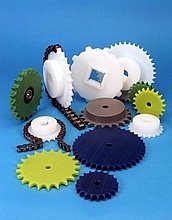 Plastics have long been identified as some of the safest and most efficient materials for a variety of uses in the food industry. Plastic sprockets are a fundamental part of any food industry conveyor system and processing machinery because their physical properties including wear resistance, wide operating temperature ranges, and superior tensile strength offer a number of crucial benefits.
Plastics have long been identified as some of the safest and most efficient materials for a variety of uses in the food industry. Plastic sprockets are a fundamental part of any food industry conveyor system and processing machinery because their physical properties including wear resistance, wide operating temperature ranges, and superior tensile strength offer a number of crucial benefits.
Why Plastic Sprockets are Great for Applications in the Food Industry
Plastic sprockets combine lightweight, durable, and easy cleaning to provide food handling equipment manufacturers with a durable, reliable, and versatile component for a variety of food preparation and transportation systems.
In applications that require moving parts to come into contact with food being processed, FDA-compliant plastic sprockets provide superior protection against contamination because they’re easy to sterilize and tolerate disinfectants without breaking down or degrading. Plastic sprockets and other plastic components are well-suited for food preparation systems because they are strong and provide non-porous surfaces that won’t harbor contaminants and bacteria or absorb odors.
Plastic sprockets are a favorite for food transportation and distribution systems as well. Their characteristic strength and wear-resistance stand up to the constant motion of commercial food preparation, packaging, transportation, and distribution systems. They combine the strength of steel with the lightness of aluminum and will not rot, mildew, or splinter under heavy use.
Some of the more popular plastic compounds used in the food industry manufacturing and distribution systems include:
Acetal Copolymer
A semi-crystalline compound with extremely low wear and good rigidity, durability, and dimensional stability. It has low moisture absorption and is easy to machine.
PEEK (Polyetheretherketone)
A semi-crystalline material that provides exceptionally high-temperature performance with good wear and friction properties and good chemical resistance. Easily machined, formed, and welded, it’s maintenance-free, wipes clean, and won’t degrade with exposure to water or steam. PEEK offers design versatility with excellent dimensional stability.
Nylon
Nylon provides excellent strength and dimensional stability in dry applications. A major problem with nylon materials is the fact that it has a high rate of water absorption.
Polyethylene (UHMW)
These olefin-based polymers feature excellent chemical resistance. Polyethylene is easy to machine, highly resistant to abrasion and stress-cracking, and has good water resistance.
Polyethylene Terephthalate Polyester (PET-P)
This semi-crystalline thermoplastic has excellent wear resistance and superior dimensional stability. It is resistant to moderately acidic solutions, capable of sustaining high loads, and has low moisture absorption.
Want to Learn More About Plastic Sprockets?
To learn more about plastic sprockets and other plastic components for food industry systems and applications, contact the plastics specialists at Slideways.


